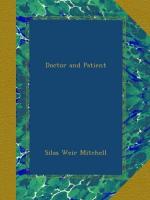It is, I fancy, well known to physicians that opium may act on an individual differently at different times. In the case of one well known to me it usually causes sleep, and no longer gives rise to nausea the next day, as it once did. Although it leaves him sufficiently wretched, and he has taken it but rarely, the drug occasionally keeps him wide awake and delightfully indifferent to the passage of time. The striking hours are heard, and that is all. There is none of the ennui of insomnia. This effect of morphia is rare with him. He may have taken morphia a dozen times in his life to ease acute pain, but only twice has it made him thus wakeful. On these nights he saw an endless succession of visions, which he did not forget, as one does common dreams. Nearly all of the hallucinations were of the most amusing character, and were often long and connected series of ludicrous situations, over which he wondered, as he lay next day, a victim to the secondary miseries due to the soothing dose of the night before. This is one of the tricks which drugs play, and is not a thing to be anticipated. The drug is the same; the man varies, and with his variations arise peculiarities in the effects of remedies.
The excess sometimes attained in the use of opiates is almost past belief. I have seen a mere girl of seventeen years take at one dose thirty grains of morphia, and I know of a woman who took for years ninety grains a day, and ruined a weak husband, a man of small means, by the costliness of her habit.
The causes of the torment, which the cessation of the use of morphia brings about, are interesting. Agonizing pains show that the nerves, long muffled, have become more acutely sensitive than they were before the fatal drug was first employed. A host of lesser troubles—insomnia, pain, and indigestion—attend the cure. I know nothing more pitiful than such an ordeal, and, despite the most watchful care, I have seen it end more than once in suicide. When one has watched a woman from whom opium has been taken away, even with skilful tenderness, roll in agony on the floor, rend her garments, tear out her hair, or pass into a state of hysterical mania, the physician is made to feel that no suffering for which she took the drug can have been as bad as the results to which it leads. The capacity to suffer, which comes on as we remove the poison, is almost inconceivable. It lasts long, and is the true difficulty in the way of forming anew habits of wholesome endurance. The physician who imagines that his case is well, because he has enabled an opium-taker to eat, sleep, and be comfortable without use of the sedative, can have seen little of the future of such people. The oversensitiveness to pain persists for months, and is a constant temptation. The moral and mental habits formed under opium—the irresolution, the recklessness, the want of shame, in a word, the general failure of all that is womanly—need something more than time to cure. But I am not preaching to the woman just set free from this bondage to sin, and speak of her only to emphasize the horror with which I would wish to inspire the well, who yet may come some day to be the suffering.




